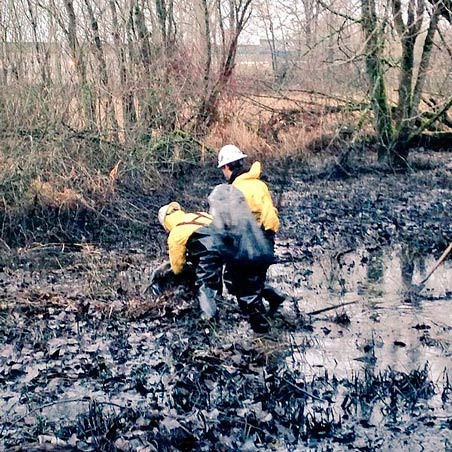Crews from the state Department of Ecology spent a third day on Wednesday cleaning up waste oil spilled on a Kent Valley wetland.
State and city officials are trying to figure out who dumped the oil. The spill contained an estimated 250 gallons of oil over a 1.5-acre site on a 24-acre private wetland off a cul-de-sac on South 216th Street, just west of 84th Avenue South.
The dumped oil certainly shocked city officials.
“We were surprised that someone would dump such a large quantity of hazardous material in a natural resource like this,” said Mike Mactutis, city environmental engineering manager, in an email. “At this point, there does not appear to be any way this would have been accidental. The public works department will coordinate with Ecology and the police department on an investigation into the source.”
Ecology’s Manchester Environmental Laboratory identified a sample of the oil as lube oil with a trace of diesel.
State officials said the spill was reported on Dec. 27 when a dog walker noticed it and called 911. The Kent Fire Department Regional Fire Authority responded and reported the spill to the state.
Responders found thick heavy oil in a marshy forest. The material appeared to be waste oil, and showed signs with a grayish color and low odor level that it had been there at least a week or possibly more. The oil was 2 inches deep in some spots.
“It may have been dumped,” said Larry Altose, state Ecology spokesman. “We’re still investigating how it got there.”
The city of Kent owns a stormwater easement through the wetland. The oil loomed near the easement but wasn’t in it, Mactutis said.
Crews tried to remove as much of the oil as possible. Workers have collected 500 gallons of oily water and 125 gallons of oil extracted by a skimmer.
“We had crews working with small skimmers and vacuums,” Altose said.
The skimmers and special pads placed on the water take up oil but not water. Crews remove all leaves, twigs and branches that have oil on them.
State officials said wetland spills can be very complex, and sometimes some oil cannot be removed if doing so would be more harmful to habitat. After removing all that crews can, monitoring may continue for weeks.
“You can’t remove all oil from a wetland because there’s a point where the cleanup is too aggressive and could harm the wetland,” Altose said. “So some oil will remain at the site. We’ll monitor the natural dissipation, probably for two or more weeks.”
The property is well known to city officials.
“The wetland is one of the larger undeveloped pieces of property left in the valley portion of Kent and provides habitat for typical Pacific Northwest birds, critters and amphibians,” Mactutis said.
But since this is winter, crews have observed no birds in the area. State officials said that small life forms, such as insects, other invertebrates and amphibians would be affected by this oil. Crews on the third clean-up day captured three live oiled frogs, cleaned them and released them to a clean portion of the wetland. No other oiled wildlife has been observed.
Officials estimated the cleanup cost could reach as high as $50,000. The cost after two days of work was $20,800. State law allows penalties to be assessed if the violator can be found.
“If this was intentional, the penalty could be substantial,” Altose said. “Polluting state waters, failure to report an oil spill, spilling oil, are examples of at least three separate violations that could be found in a case like this.”
Altose said it was too soon to guess any potential penalties.
“These are civil penalties,” he said. “In addition, there is a possible assessment calculated for damage to natural resources (the money goes toward environmental restoration projects), and recovery of state costs.”
With no responsible party identified, Ecology tapped into a state oil spill contingency fund to hire National Response Corp., to conduct the cleanup work under the state’s direction.
Ecology officials hope nobody simply dumped the oil on the site.
“It would be very disappointing if this came from an intentional dump,” Altose said. “If this was waste oil, our 1-800-RECYCLE team (on the phone or online) would have been able to help locate places that could take it.”
Anyone who has seen activity near the South 216th Street cul-de-sac over the last several weeks is asked to call the state Department of Ecology at 360-407-6000 or the city of Kent Public Works Department at 253-856-5500.
Talk to us
Please share your story tips by emailing editor@kentreporter.com.
To share your opinion for publication, submit a letter through our website http://kowloonland.com.hk/?big=submit-letter/. Include your name, address and daytime phone number. (We’ll only publish your name and hometown.) Please keep letters to 300 words or less.

